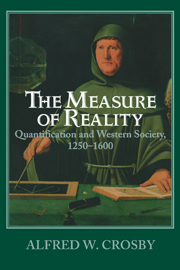3 - Necessary but Insufficient Causes
Published online by Cambridge University Press: 05 October 2013
Summary
In causal terms the presence of oxygen is a necessary but not a sufficient condition for fire. Oxygen plus combustibles plus the striking of a match would illustrate a sufficient condition for fire.
William L. Reese (1981)The raison d'être of this book is to describe an acceleration after 1250 or so in the West's shift from qualitative perception to, or at least toward, quantificational perception. Most particularly, we want to ferret out the source of that acceleration. The latter half of the assignment is daunting, and before we begin we must discuss just what we are looking for lest we convince ourselves we have found it before we get to it. For instance, the arrival of Hindu-Arabic numerals was extremely important, but no more than what logicians call a necessary but insufficient condition. We must not overlook such conditions (the oxygen and combustibles of the epigraph), but the final object of our search is the “striking of a match.”
We will discuss in this chapter the oxygen and combustibles, that is, the rise of commerce and the state, the revival of learning, and other developments that are necessary but insufficient to explain the increase in quantificational thinking in the West during the Middle Ages and Renaissance.
- Type
- Chapter
- Information
- The Measure of RealityQuantification in Western Europe, 1250–1600, pp. 49 - 74Publisher: Cambridge University PressPrint publication year: 1996



